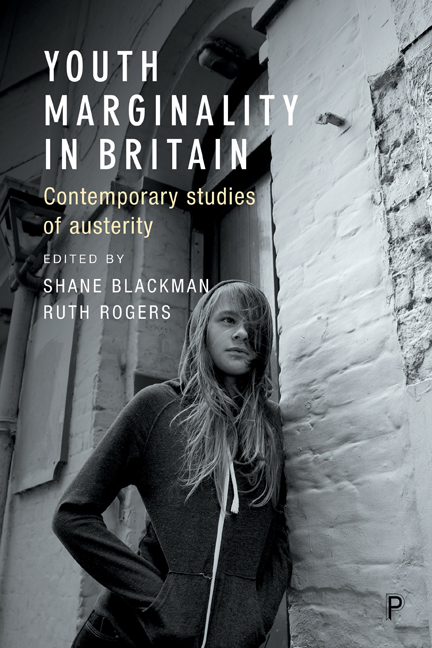Twelve - The marginalisation of care: young care leavers’ experiences of professional relationships
Published online by Cambridge University Press: 05 April 2022
Summary
Introduction
In 2003/04, in the UK, there were more people in poverty aged over 65 than aged 16–25. The opposite is now true (MacInnes et al, 2015). Young people, as the other chapters in this collection reveal, are becoming the ‘new poor’ as they struggle to cope with increasingly precarious transitions into in(ter)dependent living. This chapter focuses on marginality within a specific group of young people: care leavers. This is a group internationally recognised as being among the most disadvantaged and excluded in society (Stein and Munro, 2008; Fernandez, 2010; Mendes, 2012; Van Breda, 2015) and therefore the most vulnerable to service cuts associated with austerity in the UK.
Through retrospective biographical interviews with 15 careexperienced young adults and discussions with current practitioners, the authors explored the ways in which professional relationships in care can shape someone's identity and imagined futures. This chapter focuses specifically on the authors’ interview data with young adults, giving prominence to their voices and experiences. The narratives collated emphasise the importance of long-term, personal relationships while in care – and their absence. Structural, organisational and attitudinal barriers contributed to a relational ‘golden thread’ (The Care Inquiry, 2013) being marginalised in corporate parenting, and challenging to maintain. Legislation is changing in recognition of the incompatibility of institutional relationships with young people's own need for support. These are positive changes, but ones which, in the economic context of austerity, may be limited in their capacity to shift the powerfully embedded inequalities faced by care leavers.
Marginalised relationships in care
There is a wealth of research and practitioner-based evidence on the importance of developing and maintaining positive relationships for, and with, young people in care (Ruch, 2005; Happer et al, 2006; Stein and Munro, 2008; Winter, 2009; Munro, 2011; Ryan, 2012). This body of work has repeatedly emphasised that positive, sustained relationships in care are vital if care leavers are to experience trusting relationships in adulthood. These relationships are often central to enabling young people to manage and overcome earlier traumatic experiences, while at the same time contributing to a sense of belonging and connectedness (Ward, 2011; Wilson and Milne, 2013).
- Type
- Chapter
- Information
- Youth Marginality in BritainContemporary Studies of Austerity, pp. 191 - 206Publisher: Bristol University PressPrint publication year: 2017
- 1
- Cited by



